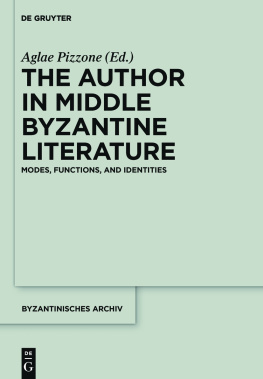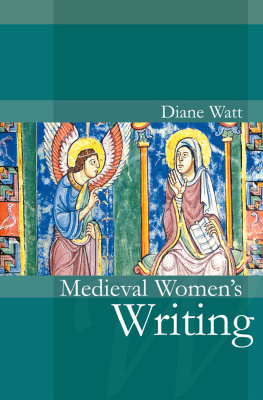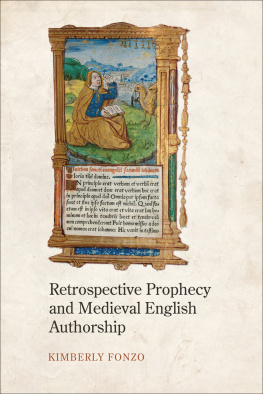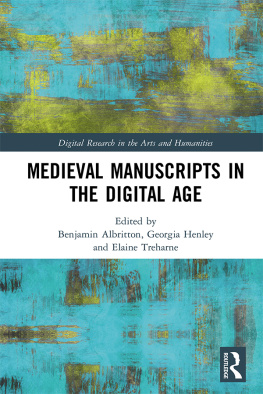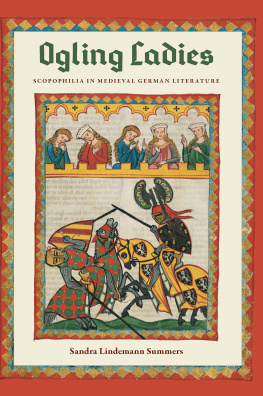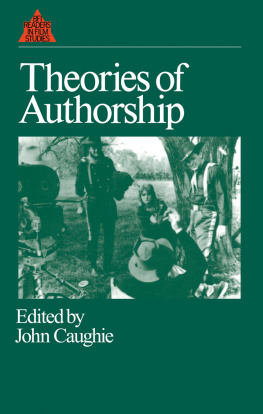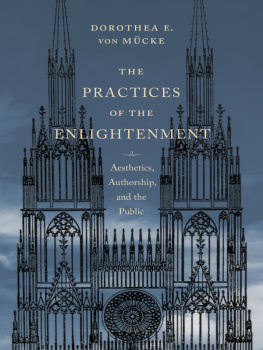AUTHOR, READER, BOOK:
MEDIEVAL AUTHORSHIP IN THEORY
AND PRACTICE
Author, Reader, Book
Medieval Authorship in Theory and Practice
EDITED BY STEPHEN PARTRIDGE
AND ERIK KWAKKEL
University of Toronto Press 2012
Toronto Buffalo London
www.utppublishing.com
Printed in Canada
ISBN 978-0-8020-9934-1
Printed on acid-free, 100% post-consumer recycled paper with vegetable-based inks.
Library and Archives Canada Cataloguing in Publication
Author, reader, book : Medieval authorship in theory and practice / edited by
Stephen Partridge and Erik Kwakkel.
Includes bibliographical references and index.
ISBN 978-0-8020-9934-1
1. Literature, Medieval History and criticism. 2. Authorship
History To 1500. 3. Authors and readers History To 1500.
I. Partridge, Stephen II. Kwakkel, Erik, 1970
PN671.A97 2012 809.02 C2011-906090-6
This book has been published with the help of a grant from the Canadian Federation for the Humanities and Social Sciences, through the Aid to Scholarly Publications Program, using funds provided by the Social Sciences and Humanities Research Council of Canada.
University of Toronto Press acknowledges the financial assistance to its publishing program of the Canada Council for the Arts and the Ontario Arts Council.
University of Toronto Press acknowledges the financial support of the Government of Canada through the Canada Book Fund for its publishing activities.
Acknowledgments
The editors wish to thank, above all, their fellow contributors for their essays and for their patience as this collection made its way through preparation, revision, evaluation, and production. Suzanne Rancourt of the University of Toronto Press likewise has been most patient and supportive. We are grateful also to two anonymous readers for the Press, whose perceptive and rigorous readings helped to make this a better book. Most essays in this collection grew out of papers delivered at the Thirty-Fourth Medieval Workshop at Green College, the University of British Columbia, in 2004, and we are happy to thank again those who helped make that occasion possible: the Committee on Medieval Studies; the Office of the Vice President, Research; the Dean of Arts; the Departments of English, History, and Central, Eastern, and Northern European Studies; the Leon and Thea Koerner Foundation; and SSHRC. As ever, the editors are indebted to their spouses, Ruth Davison and Elise Partridge.
AUTHOR, READER, BOOK:
MEDIEVAL AUTHORSHIP IN THEORY
AND PRACTICE
Introduction: Author, Reader, Book, and Medieval Authorship in Theory and Practice
STEPHEN PARTRIDGE
The editors of the present volume prompted the conversation which it records in response to two related phenomena of recent scholarship on the Middle Ages. The first consists essentially of a single book, Alastair Minniss Medieval Theory of Authorship, and its status, more than two decades after its publication, as one of the most-cited points of reference for medieval literary studies. Minnis devotes much of his book to the development of medieval ideas about pre-medieval auctores biblical, classical, and patristic. In a concluding chapter, however, Minnis points out some of the ways that the academic tradition he outlines affected how the familiar vernacular writers of the later Middle Ages presented themselves and were received by their readers. By joining the history of a set of ideas developed largely in the medieval Latin tradition with illustrations of that traditions contact with vernacular writing, Minniss book helped to enable an increased sophistication in studies of medieval literature. We may measure its influence by the frequency with which scholars consider, for example, the relative statuses of Latin and vernacular, or compilation as a medieval mode of writing whether or not such issues are at the centre of their inquiries.
The second aspect of the scholarly discourse which drew the editors interest was that, beginning at about the same time Minniss book on the theory of authorship appeared, there have also been published, in ever-increasing numbers, monographs, articles, and collections of essays which emphasize the practical manifestations and consequences of medieval ideas about authority, the author, and authorship.
Our goal in the workshop out of which this collection grew was to bring together people working on related aspects of medieval authorship but in scholarly spheres which had tended to remain rather separate. In the first instance, this meant inviting Minnis to offer reflections based on his continuing work with medieval literary commentary and theory as the framework for a series of specific studies of practice. We had other aims as well. One was to consider Latin texts together with those in the vernacular, in part to challenge notions sometimes underlying work on vernacularity that writing in Latin automatically garnered authority, or that the authority of Latin was a fixed and static value. Thus our specific studies begin with Walter Map and conclude with Erasmus, in order to show that Latin writers of the Middle Ages employed strategies to define and secure their authorship which were very similar to those used by writers in the vernacular. These two essays also serve to extend the chronological scope of debate about medieval authorship, which has usually focused on the thirteenth through fifteenth centuries, by including in our conversation Map, who wrote in the twelfth, and Erasmuss self-compilations of the early sixteenth.
There was also much to be gained from bringing into dialogue those working on several vernaculars, since studies and collections have Thus Sebastian Coxon, although writing here on Map, brings to the issue a conceptual force based in a well-developed, but not widely enough known, theoretical discourse developed from studies of Middle High German writing. Moreover, Deborah McGradys essay on Christine de Pizan provides an example of the rich vein of scholarship on the theory and practice of authorship in late medieval France. One of the collections two essays on Chaucer suggests that we can understand the manuscripts references to Chaucers compiling of the Canterbury Tales by taking into account not only the academic tradition traced by Minnis, but also the French literary culture represented by Christine, through which English writers experience of the academic tradition may have been mediated. And Erik Kwakkel, considering manuscripts of Middle Dutch writers, brings to attention a literary culture with an underrecognized influence on Middle English, including the tradition of vernacular theology explored in Kirsty Campbells essay on Reginald Pecock.
A further goal of the present collection is to demonstrate similarities between devotional authors such as Pecock and literature which was primarily secular in nature. With Pecock in the former category we might include most or all of the Dutch writers whose manuscripts are analysed by Kwakkel, as well as Robert Henryson, whose Morall fables are the subject of Iain Higginss essay, and Erasmus, whose vision of theology as poetry is discussed by Mark Vessey. On the other hand, the collection also considers the wonderfully urbane (and sometimes profane) Walter Map, and Christine and Chaucer, who while writing some devotional works seem to have identified primarily with a secular tradition. Minniss essay on the relationship of theology to poetry shows that it was sometimes difficult for medieval thinkers to separate the sacred and secular even when considering them on the theoretical plane.
Next page

